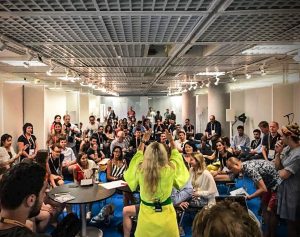I recently bought a bad book after deciding to listen to a recommendation from a person I barely knew. I end up with the most boring book on contemporary philosophy – I didn’t manage to go through more than 84 pages. Why did I trusted opinion of perso barely knew – it’s like using a New York map in San Francisco!
Buying books isn’t as easy as buying a coffee in Starbucks so I have some rules – they are my book spine.
1. Self-awareness.
We have no influence on what we like, but we have influence on what we do with it.
I DECIDED to follow what I love, not what I should love.
That’s why I only buy books that I find useful, and not from the lists like: “9 books that you have to read this year”, “100 books you need to read before death” or “45 that will teach you how to be rich and happy”.
The one who RECOMMENDS what I HAVE TO read doesn’t know me and doesn’t know what I should do / see / READ before death. That’s why my books – MY LIST OF “I HAVE TO”.
And so, rule number 1 – find out what you really want from books and accept it.
There’s no need TO FORCE YOURCELF – it is not fish opil and you are not 5.

2. Limited trust
I don’t read reviews and I don’t ask for an advice.
In one of the comments under my previous text about books someone wrote – that it’s fantastic to go to a book store and talk about what can be read and what people recommend.
But who recommends? Recommends on what basis? Why would I believe this recommendation is good?
It’s not a restaurant to ask if calamari is fresh and does the waiter recommend it.
When I travel – I don’t read guidebooks, recommendations or blogs ABOUT PLACES THAT I VISIT. I myself don’t recommend anything, unless someone asks and then it’s on his responsibility.
The rule is as follows – we can recommend someone something if we know well his “psychological dimensions”.
No one recommends shoes in a shop before asking me what do I need them for and what do I like. Ryłko shoes aren’t for me, but it doesn’t mean they are bad shoes. I wear trippens that MAJORITY OF PEOPLE I KNOW consider the ugliest shoes in the world – but I love them as much as I like ice cream or walking in the rain.
It’s similar with books – you can’t ask for an opinion if you’re not SURE that this person knows what you need.
So I trust only opinions from people, whose psychological dimensions I know. They don’t have to be from the same kindergarten, work space or gym, but they need to have a similar thinking system.
If someone impressed me on a conference (that happnes almost never), taught me something – there is a good chance, that his recommendations will make a similar impression on me. When I’m at the Cannes Lions or Eurobest festival – I always later connect on social media with speakers I admire. If they recommend something – I’m in for it!
I trust people that know me better than I know myself and are reasonable enough to not expose me to time wasting.

3. Slow immersion
I love the time spent in a book store. It’s MY time. I don’t like sharing it with anyone and I don’t like when someone tries to talk to me. I am not a baby – I don’t need to be entertained.
I always choose sections such as: psychology, business, religion, biographies and there I create my book SPA.
I go through all books that are there. I have few rules, some may consider them controversial but they work for me.
- If a title offends my intelligence – I put it back. Offensive, like – “how to be happy in 5 minutes”; “It’s never too late to create good relations” etc. I don’t read summaries and I don’t want the book to fix me. Back to point 1 – I know that I need inspiration and knowledge, not a book therapist.
- I don’t buy too thin books because with them it’s like with a single ice cream scoop – you’re only going to get mad that it’s so little and you’ll want more. I need a plane trip or at least a train, not one tram stop.
- I always read the back cover and the author’s bio – if I’m not moved by it – I put it back.
- If it did move me – I read the table of contents and then I open on a random page – if after a chapter I don’t feel like reading any more – the book lands back on the shelf.
There are a lot of books and there isn’t much time. My need for knowledge is GIANT. I need something that absorbs me like a black hole, so that I forget about the whole world and I will only hear the sound of my green marker.

4. Small print
When we conduct studies on banking in IZMAŁKOWA – the conclusion always is that people are afraid of these parts of a contract that are written with small print. They’re always afraid that they will contain something catchy, something that will deprive them of their homes, make them bankrupt. What doesn’t work with contracts – works perfectly fine with books. I love small print. And I only buy books written with a small font and one interline spacing.
It’s not a phobia or aesthetic preference. Large font can be usually found in books that process someone’s thoughts, without bringing in new ones. It’s typical for guides and self help type of books, like: Help yourself, Learn in 5 minutes or during a weekend, 101 the most important things you need to know about….
Large print is a simplified version of what is written somewhere else with a small print.
I like to get to my own conclusions and I don’t like when someone does that for me. My conclusions on my responsibility. I prefer to choose by myself what I consider important and adequate.

5. Summaries
From psychology of learning we know that we only memorize a part of the learning materials that we work on. Which means that while reading a summary, we memorize only let’s say 20% of information. And what is 20% of 20%? – but I don’t know if “Crime and Punishment” summed up on 15 pages isn’t 20% but 2% of the whole thing…
That’s why books that contain for example a summary of the 10 most important business books of the decade – seem absurd to me.
If these are the most important books – I need to find time to read them.
I treat similarly summaries of books like psychology self help. If I’m not in a total depression and desperation – I prefer to read Karen Horney, Jung, Hellinger or other leading psychologists rather than wasting time on searching for a emotioinal band-aid
I personally don’t practice shortcuts – but of course, it all depends on preferences.
6. Unknown world
I love book stores in India. India has genius writers in the fields of philosophy and business. The reason why I love these books is that the chance for someone from my environment will ever read them is close to zero.
It means that I have a knowledge that no one else will have.
Throughout the years I convinced myself of one thing: Your competition reads the same books, goes to the same lectures, and watches the same YouTube videos. And that’s why we all still do the same things. WE CONDUCT marketing ACTIVITIES THE same WAY. WE WRITE AN article ON THE SAME SUBJECTS. We differ in style but not in contents.
So if you want to be original – you must have original knowledge. You need to have a DIFFERENT view.
It was always like that for me. That’s what I believe – that’s how I operate.
Books in the FIELD of philosophy and religion always helped me to create genius strategies, compile unbelievable research techniques, create such an in depth research analysis in IZMAŁKOWA, that when my customers GATHERED ON A PRESENTATION HEARD IT – they didn’t want to leave, they WANTED MORE.

7. I love books of THOSE who I love
There are authors that I love with great love and passion.
I buy everything they write.
THAT IS AN EXCEPTION IN WHICH I don’t apply to any of the rules from point 3.
I don’t check anything. I don’t read fragments at random. I buy and I can’t wait for this special moment when I start reading it.
Murakami, Yalom, Zimbardo, Ferguson, Kahneman – I don’t think when buying their books. I will jump into fire after them.
These are my 7 rules that I follow while choosing books. These aren’t any guidelines or musts. I share them – because people often ask me how do I choose my books. If you find any of this useful – great. If not – you surely have your own methods and there is no better rule than having self-awareness and following it.




